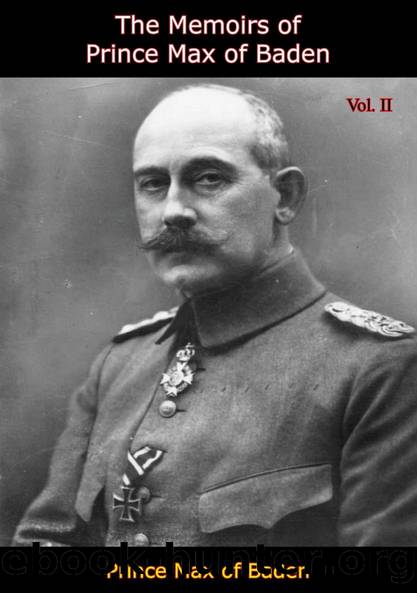The Memoirs of Prince Max of Baden Vol. II by Prince Max of Baden Baden W. M. Calder

Author:Prince Max of Baden Baden, W. M. Calder [Prince Max of Baden Baden, W. M. Calder]
Language: eng
Format: epub
ISBN: 9781789120431
Barnesnoble:
Publisher: Arcole Publishing
Published: 2018-02-27T00:00:00+00:00
CHAPTER VIâPOLITICAL EFFORTS DURING THE VICTORIOUS OFFENSIVE (MARCH TO JULY 1918)
THE feeling of irresistibility which accompanied our troops at the beginning of the battle cannot be described. The front frozen for years was thawing. Confidence in leadership and victory had never been greater, not even in August 1914.
In the military section of the Foreign Office there worked a young officer, a well-known writer, with a talent for description, who was always sent to the âbig showsâ to write an account of them. Before the offensive he had been an enthusiastic supporter of the peace of understanding. He now came back from the battle in the west and rushed into Haeftenâs office with the words: âNever worry! What an experience!...World dominion!â
The exultation leaped over to the population at home. An associate wrote: âIt would seem that we neednât say âNoâ to Briey and Longwy.â The peace resolution could not be referred to in the presence of the Reichstag Majorityâthey took it ill. In the Inter-Party Committee Fischbeck shouted triumphantly to Haussmann: âThe gas shells are doing it, arenât they?â At the Press conference an editor asked Lieutenant-Colonel von Haeften whether wireless stations had been provided for the various stages of the German advance to enable the correspondents to send out news of the victories. The public announcements of these days cannot be read without fear of the envy of the gods. But at the time they reflected the temper of the army and of the people at home.
On 25th March, 1918, General Field-Marshal von Hindenburg was awarded the Iron Cross with Golden Rays, a distinction which had only been given once beforeâto Blücher for his victory at Waterloo. The battle itself received the name of the âKaiser battleââagainst the wish of the Kaiser.
On 1st April the Reichstag was given a mild rebuff by the General Field-Marshal, an experience which it did not seem to mind:
âThe Briton and the Frenchman must not think that the new blood offerings which they have forced us to make, can be made for nothing. I share the armyâs confidence that the Reichstag appreciates this desire of the brave men at the front, the best sons of the people, and will also, for its part, stand up for the strong German peace which alone can spare us war in the future.â
At the end of March I received the following report on the situation:
âLieutenant-Colonel von Haeften left on Sunday evening, as the result of an unexpected summons, to see General Ludendorff, who is conducting the operations in a quiet place close to the front....
I should like in conclusion to refer once more to the necessity for intervention. At present a wave of jingoism is going through the country. Close friends of mine are being swept away by it. This is of course partly the just pride of a people standing once more on its feet, a people which felt as humiliated by the insolence of the enemy as it did by the cries of distress which Erzberger sent to the enemy countries.
Download
This site does not store any files on its server. We only index and link to content provided by other sites. Please contact the content providers to delete copyright contents if any and email us, we'll remove relevant links or contents immediately.
| Afghan & Iraq Wars | American Civil War |
| American Revolution | Vietnam War |
| World War I | World War II |
Waking Up in Heaven: A True Story of Brokenness, Heaven, and Life Again by McVea Crystal & Tresniowski Alex(37794)
Empire of the Sikhs by Patwant Singh(23074)
We're Going to Need More Wine by Gabrielle Union(19035)
Hans Sturm: A Soldier's Odyssey on the Eastern Front by Gordon Williamson(18579)
Leonardo da Vinci by Walter Isaacson(13319)
The Radium Girls by Kate Moore(12019)
Tools of Titans by Timothy Ferriss(8369)
Educated by Tara Westover(8047)
How to Be a Bawse: A Guide to Conquering Life by Lilly Singh(7472)
Permanent Record by Edward Snowden(5839)
The Last Black Unicorn by Tiffany Haddish(5630)
The Rise and Fall of Senator Joe McCarthy by James Cross Giblin(5275)
Promise Me, Dad by Joe Biden(5144)
The Wind in My Hair by Masih Alinejad(5092)
A Higher Loyalty: Truth, Lies, and Leadership by James Comey(4954)
The Crown by Robert Lacey(4807)
The Iron Duke by The Iron Duke(4350)
Joan of Arc by Mary Gordon(4103)
Stalin by Stephen Kotkin(3958)
